
Sunscreen is a crucial skincare product designed to protect our skin from the harmful effects of ultraviolet (UV) radiation, which can lead to sunburn, premature aging, and an increased risk of skin cancer. It acts as a shield, either absorbing or reflecting the UV rays before they can penetrate the skin.
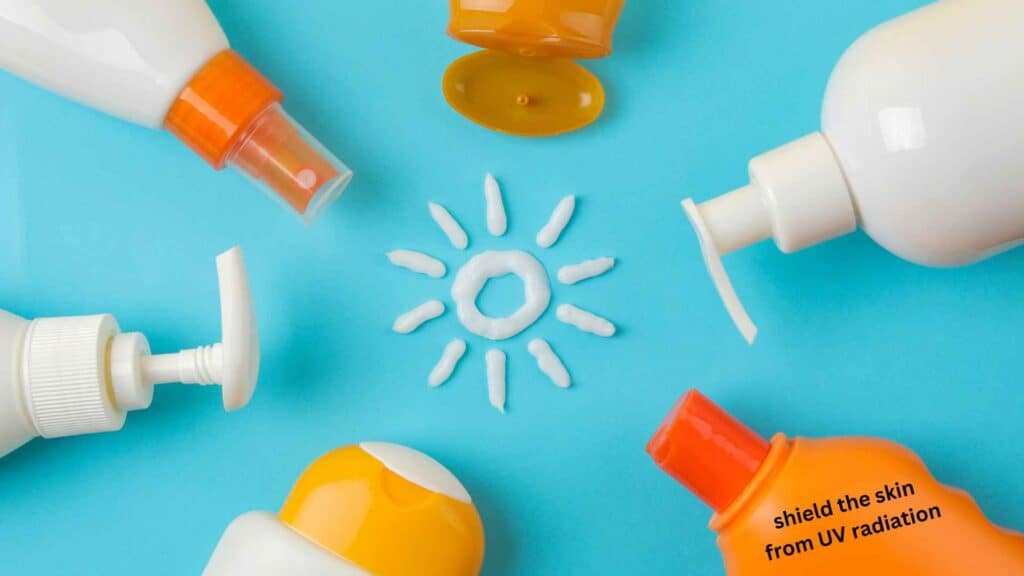
Sunscreen contains active ingredients that act as filters to shield the skin from UV radiation. There are two main types of sunscreen: physical blockers and chemical absorbers. Physical blockers, like zinc oxide and titanium dioxide, create a protective barrier on the skin’s surface, reflecting UV rays away. On the other hand, chemical absorbers, like avobenzone and octocrylene, absorb UV radiation and transform it into heat energy, which is then released from the skin.

The claim that sunscreen can lighten the skin has sparked curiosity and concerns among many individuals. Some believe that regular use of sunscreen may lead to a gradual lightening of the skin’s tone. However, the scientific evidence does not support this claim. Sunscreen’s primary function is to protect the skin from UV damage, not to lighten it.
In this article, we aim to provide a comprehensive analysis of the claim, examining scientific research and reliable sources to determine if sunscreen indeed has a skin-lightening impact. By critically evaluating the available information, we can separate myths from facts and offer readers an informed perspective on the role of sunscreen in maintaining skin health and protecting against UV damage. Let’s explore the evidence and uncover the truth behind the claim: “Does sunscreen make your skin lighter?”
Let’s dive into it.
Does sunscreen make your skin lighter? Fact or Fiction?

To find out whether this statement is correct, there are some investigations and studies that confirm whether it is correct or not.
I. Investigating Scientific Evidence on Sunscreen’s Impact on Skin Tone
Scientific studies have extensively explored the relationship between sunscreen use and skin tone. Research published in the Journal of the American Academy of Dermatology indicates that sunscreen’s primary function is to protect the skin from harmful UV rays and prevent sunburn. However, there is limited evidence to support the claim that it directly lightens the skin.
II. Analyzing Studies on Long-Term Sunscreen Use and Potential Skin Lightening Effects
Long-term studies on sunscreen use have primarily focused on its efficacy in reducing sunburn and minimizing the risk of skin cancer. The U.S. Food and Drug Administration (FDA) emphasizes that regular sunscreen application can help protect the skin from the harmful effects of the sun’s UV radiation. However, these studies do not specifically demonstrate skin lightening as a direct effect of sunscreen use.
III. Addressing Contradictory Findings and Drawing Conclusions
While some undependable evidence might suggest that prolonged use of sunscreen leads to a lighter skin tone, it is essential to interpret such claims carefully. Dermatologists associated with the American Academy of Dermatology Association (AAD) stress that sunscreen’s primary role is sun protection, and there is no substantial scientific evidence supporting the claim that it lightens the skin.
What are the Long-Term Effects of Sunscreen Use? Will it make the skin lighter?
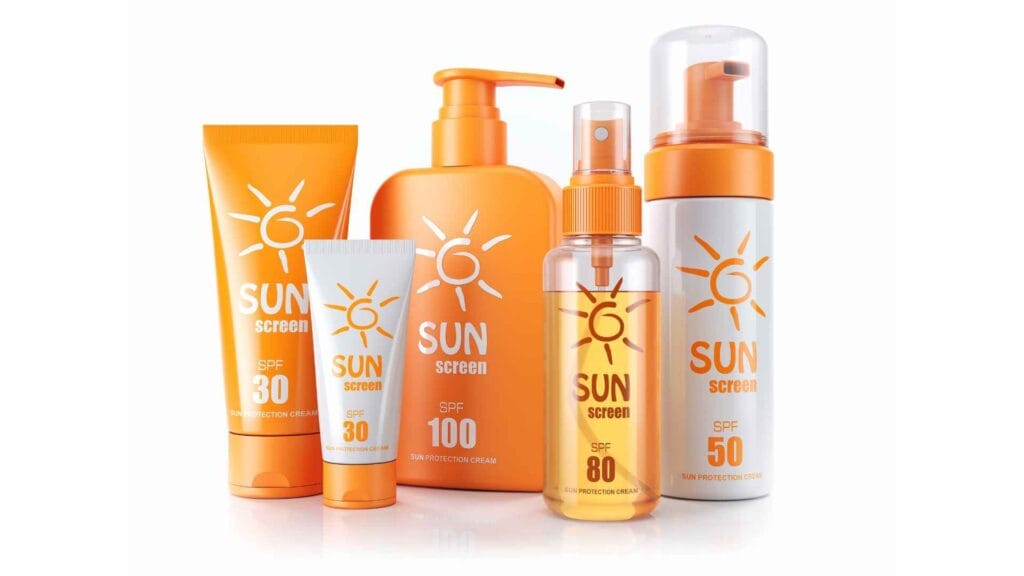
As we explore the long-term effects of sunscreen use, it is important to clarify that sunscreen’s primary purpose is not to lighten the skin. Scientific research and studies show that sunscreen plays a vital role in preventing photoaging, reducing hyperpigmentation, and maintaining overall skin health and radiance. So while it won’t lighten the skin, incorporating sunscreen into your daily skincare routine remains crucial in protecting your skin from the sun’s harmful rays and preserving its youthful appearance for years to come.
Following are some of the benefits of regular use of sunscreen.
I. Assessing the Benefits of Regular Sunscreen Application
Regular sunscreen application offers numerous benefits in maintaining healthy skin. According to the Skin Cancer Foundation, sunscreen acts as a protective barrier, shielding the skin from harmful UV radiation and reducing the risk of sunburn and skin cancer. By creating this barrier, sunscreen helps preserve the skin’s integrity and prevent premature aging caused by prolonged sun exposure.
II. Examining the Relationship Between Sunscreen and Photoaging Prevention
One of the most significant long-term effects of sunscreen use is its role in preventing photoaging. Studies published in the Journal of Investigative Dermatology revealed that consistent sunscreen application helps combat the development of wrinkles, fine lines, and age spots, commonly associated with photoaging. The protective shield offered by sunscreen significantly reduces the detrimental impact of UV rays on collagen and elastin fibers, preserving the skin’s youthful appearance.
III. Exploring the Role of Sunscreen in Reducing Hyperpigmentation
Hyperpigmentation is a common skin concern caused by the overproduction of melanin in response to UV exposure. The American Academy of Dermatology Association (AAD) emphasizes that daily sunscreen use plays a crucial role in managing hyperpigmentation by preventing further darkening of existing spots and minimizing the development of new ones. Sunscreen’s protective barrier acts as a key tool in maintaining an even skin tone and reducing the appearance of hyperpigmentation.
Exposing Misconceptions About “Does sunscreen make your skin lighter”.
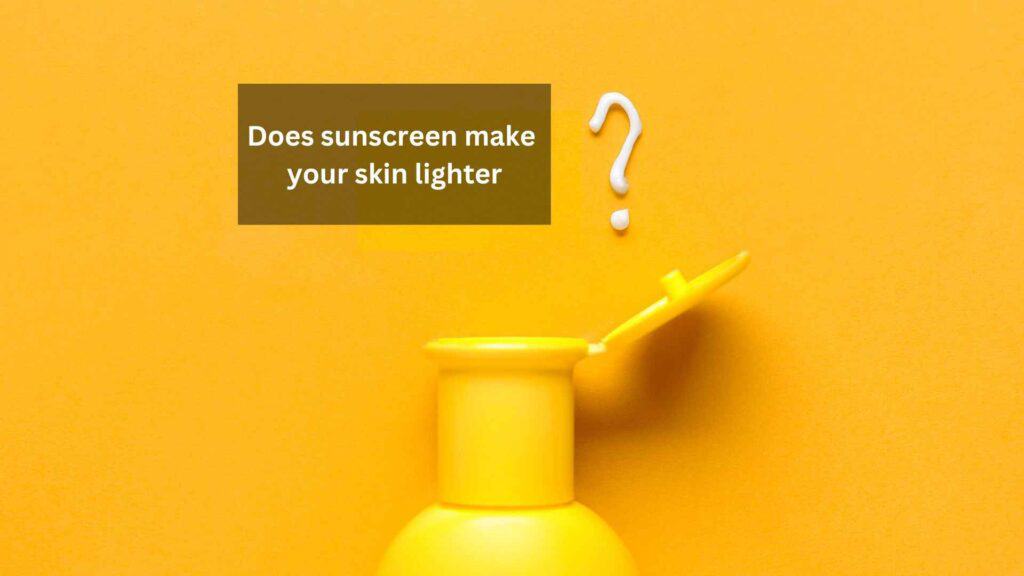
In this part, we’ll uncover and explain the misunderstandings people have about sunscreen.
I. Addressing Common Myths about Sunscreen and Skin Lightening
There are several prevalent myths surrounding the relationship between sunscreen and skin lightening. These misconceptions often lead to confusion among individuals seeking effective sun protection. Contrary to popular belief, sunscreen’s primary purpose is not to lighten the skin but rather to shield it from the harmful effects of UV radiation.
II. Providing Evidence-Based Explanations for Skin Tone Changes
Scientific research indicates that the notion of sunscreen directly causing skin lightening lacks substantial support. A comprehensive study conducted by the National Center for Biotechnology Information (NCBI) emphasizes that while sunscreen is effective in preventing sunburn and skin damage, there is no conclusive evidence linking its use to significant skin lightening. Any perceived changes in skin tone could be attributed to other factors, such as reduced sun damage and photoaging prevention.
III. Promoting Accurate Information on Sunscreen Use and Skin Health
To dispel misconceptions and provide accurate information, it is essential to rely on credible sources in the field of dermatology. Organizations like the Skin Cancer Foundation emphasize the importance of sun protection through proper sunscreen application, debunking unfounded claims about skin lightening. By promoting evidence-based knowledge, individuals can make informed decisions about their skincare routine and sun protection practices, ensuring optimal skin health.
Sunscreen for Hyperpigmentation and Dark spots
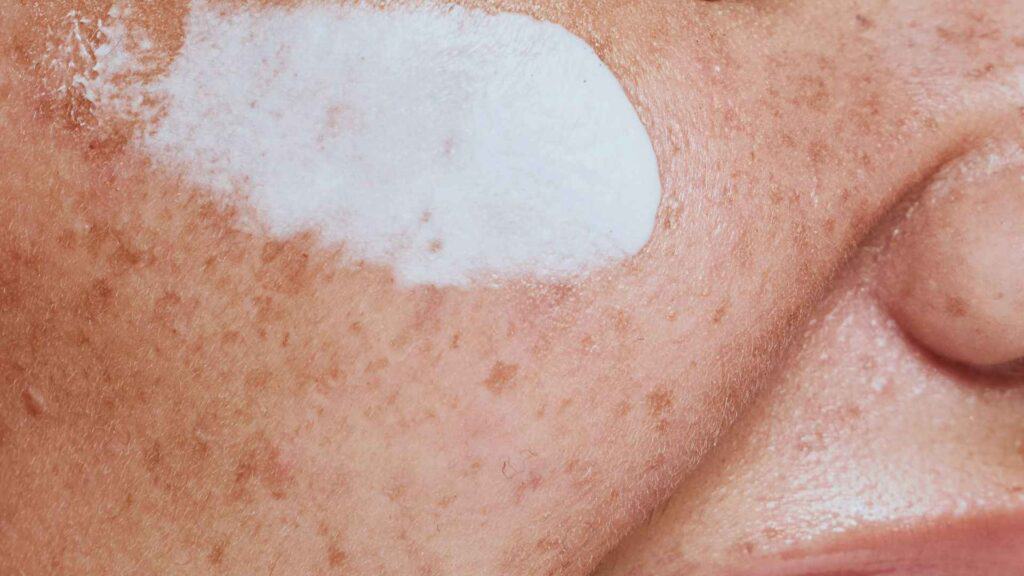
In this segment, we’ll explore how sunscreen can help manage hyperpigmentation and dark spots, providing insights into its role as a valuable tool in maintaining an even and radiant complexion.
A. Understanding Hyperpigmentation and Its Causes
Hyperpigmentation is a common skin condition characterized by the darkening of certain areas of the skin due to an increase in melanin production. UV exposure, hormonal changes, acne, and inflammation are among the primary causes of hyperpigmentation.
B. Evaluating the Role of Sunscreen in Managing Skin Conditions
Sunscreen plays a vital role in managing hyperpigmentation and preventing its worsening. The American Academy of Dermatology Association (AAD) stresses that daily sunscreen use is crucial to protect the skin from UV rays, which can trigger and exacerbate hyperpigmentation. By applying sunscreen with a high SPF regularly, individuals can shield their skin from UV-induced melanin production and help reduce the appearance of dark spots.
C. Recommending Specific Sunscreen Types for Different Skin Needs
Choosing the right sunscreen for specific skin needs is essential for optimal results. For individuals with hyperpigmentation, dermatologists often recommend broad-spectrum sunscreens with physical blockers (zinc oxide or titanium dioxide), as they offer effective protection against both UVA and UVB rays without triggering irritation or inflammation. Those with oily or acne-prone skin may benefit from non-comedogenic and oil-free formulas.
Additionally, individuals with sensitive skin should opt for sunscreens labeled as fragrance-free and hypoallergenic to minimize the risk of adverse reactions. Sunscreens with added antioxidants like vitamins C and E can provide extra protection against free radicals that may contribute to hyperpigmentation.
Understanding the relationship between sunscreen and hyperpigmentation is vital for effectively managing skin conditions and promoting overall skin health. By incorporating sunscreen into a comprehensive skincare routine, individuals can take proactive measures to protect their skin and reduce the appearance of dark spots caused by hyperpigmentation.
Factors to Consider When Using Sunscreen

In this section, we’ll discuss important things to keep in mind while using sunscreen, ensuring you get the best protection for your skin and maintain its health and beauty.
A. The Significance of SPF and Broad-Spectrum Protection

The sun protection factor (SPF) is a crucial factor to consider when choosing sunscreen. The SPF rating indicates how well the sunscreen can protect the skin from UVB rays, which are responsible for sunburn. The American Academy of Dermatology Association (AAD) recommends using sunscreen with an SPF of 30 or higher to ensure adequate protection against harmful UVB rays.
In addition to SPF, it is essential to look for broad-spectrum protection on the sunscreen label. Broad-spectrum sunscreens protect the skin from both UVA and UVB rays, guarding against sunburn and skin aging, including hyperpigmentation and photoaging.
B. Choosing the Right Sunscreen for Individual Skin Types

Considering individual skin types is essential for selecting a sunscreen that suits specific needs. Those with oily or acne-prone skin should opt for oil-free and non-comedogenic formulas to prevent clogged pores and breakouts. For individuals with dry or sensitive skin, a sunscreen with added moisturizing agents, like glycerin or hyaluronic acid, can provide hydration while offering sun protection.
People with specific skin concerns, such as hyperpigmentation or melasma, should choose a sunscreen with physical blockers (zinc oxide or titanium dioxide) as they are less likely to trigger skin irritation and can provide effective protection against UVA and UVB rays.
C. Importance of Consistent and Appropriate Sunscreen Application

The effectiveness of sunscreen relies on consistent and appropriate application. It is essential to apply sunscreen generously to all exposed areas of the skin, including the face, neck, ears, and hands. The AAD recommends using approximately one ounce (about a shot glass full) to cover the entire body during each application.
Reapplying sunscreen is crucial, especially after swimming, sweating, or spending extended periods outdoors. Ideally, sunscreen should be reapplied every two hours, regardless of the water-resistant claims, to maintain continuous protection.
By considering these factors and incorporating sunscreen into a daily skincare routine, individuals can better protect their skin from the harmful effects of UV radiation and maintain healthy, radiant skin.
Sunscreen and Skin Health
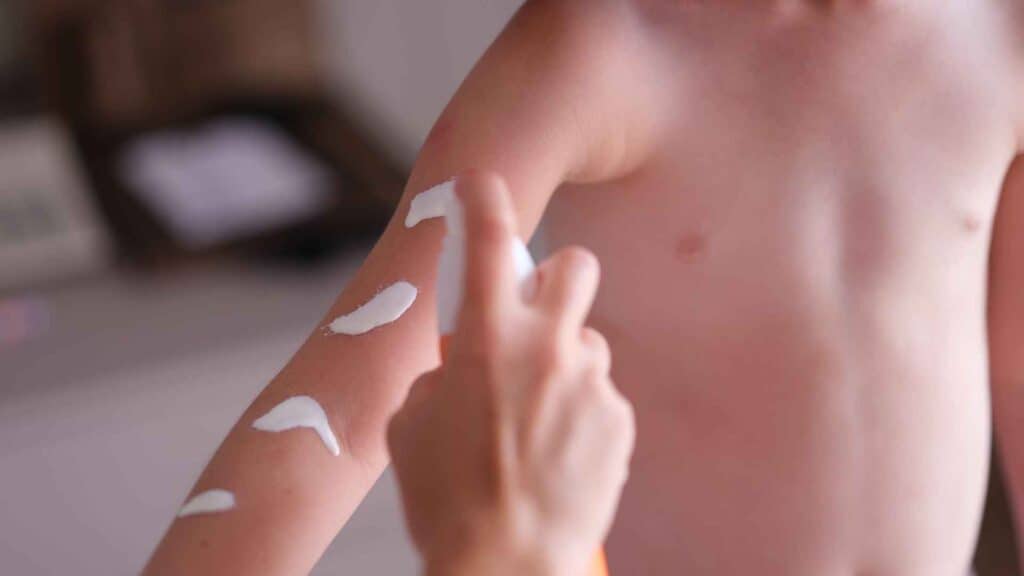
In this part, we’ll delve into how sunscreen plays a crucial role in keeping your skin healthy and protected from the harmful effects of the sun, ensuring its long-term well-being and radiance.
A. Emphasizing the Primary Purpose of Sunscreen: Sun Protection
The primary purpose of sunscreen is to protect the skin from the damaging effects of the sun’s ultraviolet (UV) radiation. Sunscreen forms a protective barrier on the skin’s surface, absorbing and reflecting UV rays before they can penetrate the skin. By doing so, sunscreen helps prevent sunburn, skin aging and significantly reduces the risk of skin cancer.
B. Addressing Concerns Related to Sunscreen Use (Clogged Pores, Breakouts)
Some individuals may have concerns about sunscreen causing clogged pores and breakouts. However, modern sunscreens are formulated to be non-comedogenic and less likely to cause acne. It is essential to choose oil-free and non-comedogenic sunscreens, especially for those with acne-prone or oily skin. Additionally, individuals can opt for lightweight and gel-based formulations to minimize the risk of pore blockage.
C. Promoting Informed and Responsible Sun Protection Habits
To ensure maximum effectiveness, it is crucial to use sunscreen correctly. Applying sunscreen 30 minutes before sun exposure allows time for it to bind to the skin properly. Sunscreen should be reapplied every two hours, or more frequently if swimming or sweating, to maintain its protective barrier.
In addition to sunscreen, adopting other sun protection habits is essential for overall skin health. Seeking shade during peak sun hours (10 a.m. to 4 p.m.), wearing protective clothing, such as hats and long-sleeved shirts, and using sunglasses to shield the eyes from UV rays are all beneficial practices. Avoiding tanning beds is equally crucial, as they emit harmful UV radiation that can lead to skin damage and an increased risk of skin cancer.
Promoting informed and responsible sun protection habits can significantly contribute to maintaining healthy skin and reducing the risk of sun-related skin conditions. By understanding the true purpose of sunscreen and implementing proper sun protection measures, individuals can enjoy the outdoors while safeguarding their skin’s health.
Conclusion
“Does Sunscreen Make Your Skin Lighter?” – Unveiling the Truth
A. Summarizing the Findings on Sunscreen and Skin Lightening
In the quest to uncover the truth behind the question, “Does sunscreen make your skin lighter?” we have explored an array of scientific evidence and expert insights. It is clear that while sunscreen is a powerful tool for safeguarding the skin from the harmful effects of UV radiation, its primary purpose is not to lighten the skin. Scientific studies and reputable sources consistently emphasize that sunscreen’s role revolves around sun protection and the prevention of sunburn, premature aging, and skin cancer.
B. Recapping the Importance of Sun Protection for Overall Skin Health
The journey through the realm of sunscreen has underscored a fundamental reality: sun protection is paramount for maintaining healthy and radiant skin. The sun’s UV radiation poses significant risks, including photoaging, hyperpigmentation, and an increased likelihood of skin cancer. By incorporating sunscreen into our daily routines, we fortify our skin’s defense against these potential pitfalls and lay the foundation for long-lasting skin health.
C. Encouraging Readers to Use Sunscreen Responsibly and Regularly
As we conclude our exploration, a resounding message resonates: use sunscreen responsibly and regularly. The power to shield our skin from the sun’s formidable forces lies within the simple act of applying sunscreen. By adhering to expert recommendations, such as choosing the appropriate SPF, embracing broad-spectrum protection, and reapplying diligently, we empower ourselves to embrace the outdoors confidently and conscientiously.
In the grand tapestry of skincare, sunscreen stands as a guardian, a shield, and a timeless companion. Let us embrace its protective embrace, not merely for the allure of lighter skin, but for the profound gift of skin health and well-being. The journey to uncover the truth has illuminated our path, reminding us that while sunscreen may not alter our skin’s hue, it does hold the power to safeguard its radiance and vitality for years to come.
So, the next time you ask, “Does sunscreen make your skin lighter?” remember that the answer lies not in a quest for a changed hue, but in the radiant embrace of a sun-protected future.
Frequently Asked Questions (FAQs)
What is the recommended SPF level for sunscreen?
The American Academy of Dermatology Association (AAD) recommends using sunscreen with an SPF of 30 or higher. SPF 30 provides sufficient protection against UVB rays, which cause sunburn (Source: American Academy of Dermatology Association, “Skin Cancer”).
Can I use sunscreen on my face every day?
Yes, daily sunscreen application is essential for overall skin health. It helps protect the skin from UV damage, prevents premature aging, and reduces the risk of skin cancer. Choose a sunscreen specifically formulated for the face to avoid clogging pores or causing breakouts.
Is it necessary to reapply sunscreen throughout the day?
Yes, regular reapplication of sunscreen is crucial for sustained protection. Reapply every two hours, or more frequently if swimming or sweating, to maintain the sunscreen’s efficacy (Source: Centers for Disease Control and Prevention, “Sun Safety”).
Dispelling Misconceptions and Providing Evidence-Based Answers
Does sunscreen cause vitamin D deficiency?
While sunscreen can reduce the skin’s ability to produce vitamin D, it does not typically cause deficiency. Adequate vitamin D levels can be maintained through diet, supplements, and limited sun exposure when sunscreen is not used.
Can sunscreen irritate sensitive skin?
Yes, some sunscreens may contain ingredients that could irritate sensitive skin. Look for sunscreens labeled as fragrance-free and hypoallergenic, and consider using physical blockers like zinc oxide or titanium dioxide, which are less likely to cause irritation.
Will wearing sunscreen prevent me from getting a tan?
Sunscreen helps protect the skin from harmful UV radiation, reducing the risk of sunburn and skin damage. While it may minimize tanning, it is not intended to completely prevent a tan. Using sunscreen responsibly can help achieve a safer and more gradual tan.
Encouraging Readers to Make Informed Decisions about Skincare
Empowered with knowledge and expert insights, readers are encouraged to make informed decisions about their skincare routines. Sunscreen is a powerful ally in maintaining healthy, radiant skin, and its proper use is fundamental to sun protection. By understanding sunscreen’s benefits and dispelling misconceptions, readers can confidently embrace sun-safe practices and enjoy the beauty of the outdoors responsibly.
Sources:
https://www.cdc.gov/cancer/skin/basic_info/sun-safety.htm
https://www.ncbi.nlm.nih.gov/pmc/articles/PMC5843359/
https://www.aad.org/public/everyday-care/sun-protection/shade-clothing-sunscreen/sunscreen-faqs
https://www.who.int/news-room/questions-and-answers/item/radiation-ultraviolet-(uv)






2 thoughts on “Does sunscreen make your skin lighter?”
Such a Great and Surprising Content
Great Content Writer 👍👍👍
Wishing you ❣️ Best of Luck Boss
Glad to hear that, Aqsa…. I will be pleasure to help more. Thanks for visiting the article.